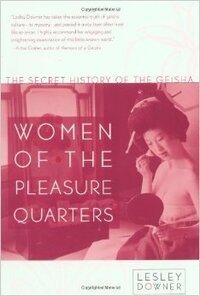Take a photo of a barcode or cover
Overall a very interesting and educational book. If you’re interested in geisha or Japanese culture, you will likely enjoy it. The two main issues I have with it-
1. It’s not in chronological order. I was expecting something organized, from how geisha first started to where they are today. But the author jumps all over the place and does not present a smooth flow of time.
2. Some of the same ideas, opinions or points are repeated multiple times, which is annoying and out of place. This is supposed to be a historical book, not an opinion piece.
Other than these issues though, there is a lot of good information. You can picture the geisha, learn about their lives in different periods, learn about Japanese culture, and imagine what it was like back then. The author does a decent job of writing with an open mind, remembering that Japanese and Western cultures have different ideas of what is moral and acceptable.
1. It’s not in chronological order. I was expecting something organized, from how geisha first started to where they are today. But the author jumps all over the place and does not present a smooth flow of time.
2. Some of the same ideas, opinions or points are repeated multiple times, which is annoying and out of place. This is supposed to be a historical book, not an opinion piece.
Other than these issues though, there is a lot of good information. You can picture the geisha, learn about their lives in different periods, learn about Japanese culture, and imagine what it was like back then. The author does a decent job of writing with an open mind, remembering that Japanese and Western cultures have different ideas of what is moral and acceptable.
A thoughtful exploration and examination of geisha, their precursors, and their history. Miss Downer provides a lot of helpful context to those approaching this secretive "flower and willow world" as an outsider and it goes a very long way to dispel a lot of the rumors and misconceptions Westerners have possibly come to hold regarding geisha and introduced a lot of terms, some I had passing familiarity with and some that were completely new to me. I highly recommend this read to anyone curious about this part of Japanese culture and history; and if you are anything like me, you will come away with a lot of your questions answered.
I found the first half (the evolution of what a geisha is today) to be very interesting and really well laid out but as we progressed more towards the 21st century the narrative started to bore because it just seemed to keep repeating the same ideas constantly. Still I'm happy to had read it . . . at least the first half.
Good overview of the women who worked as different types of entertainers throughout Japan's history.
I wanted to learn more about Japanese culture and history, but specifically regarding women - and hopefully written by a woman. I thought the geisha culture was a good place to start; and so did this author. I was challenged as a reader - as is sort of mirrored by the experience of the author as she seeks information and life stories in country. The author's journey and the resulting content of the book are fascinating.
Another book that has been sitting on my bookshelf for ages off the list! Please excuse me while I do a victory dance.
I bought this book back in 2005 or so, so it's been a really long time coming. It's even signed by the author, which probably should have been motivation for me to actually read it. But whatever. I have finally completed it!
I thought that this was a very informative book about the geisha world, both historically and in more recent times. I really enjoyed learning about the origins of the geisha, as well as seeing how things have changed for them over the years. I did find the book a little bit repetitive at times, but still very enjoyable. Part of me wishes that Lesley Downer had been a little bit less factual and a little more interested in speculating in the future of geisha, as that's a question I'd very much like answered, but I suppose I can understand why she didn't. I definitely appreciated how she was able to fill the gaps in my knowledge, not just about geisha, but also about some of the larger social issues in Japan. Even having spent some time there, I found it very illuminating.
Very much recommended for anyone with an interest in geisha and their world.
I bought this book back in 2005 or so, so it's been a really long time coming. It's even signed by the author, which probably should have been motivation for me to actually read it. But whatever. I have finally completed it!
I thought that this was a very informative book about the geisha world, both historically and in more recent times. I really enjoyed learning about the origins of the geisha, as well as seeing how things have changed for them over the years. I did find the book a little bit repetitive at times, but still very enjoyable. Part of me wishes that Lesley Downer had been a little bit less factual and a little more interested in speculating in the future of geisha, as that's a question I'd very much like answered, but I suppose I can understand why she didn't. I definitely appreciated how she was able to fill the gaps in my knowledge, not just about geisha, but also about some of the larger social issues in Japan. Even having spent some time there, I found it very illuminating.
Very much recommended for anyone with an interest in geisha and their world.
A shallow how-to guide for those that desperately want to become geisha, like the author, but ultimately have no chance in hell (due to their tainted blood). It gives some basic information about the water trade that was interesting though, but is all keeping with the romance and glamour of naughty Japan made popular by Arthur Golden.
This was a very interesting book about the secretive world of the geisha in Japan. The author covers a lot, from the history of the profession up to how they'd adapted to the modern world.
My main criticism of this book was the way the author described some of the women she met. She would often use words like "frumpy" and give a breakdown of their facial features, often with some form of negative comment. I know the world of geisha is all about beauty but I found these descriptions to be jarring and unnecessary. After all, the reader doesn't have to know the person being interviews has a slightly chubby face in order to learn or empathise with them, do they? It was just something I noticed and that I liked less and less as I read the book.
There was also a bit of repetition of certain ideas and statements.
However, this was a good book to learn a bit about the history of Japan as a whole, especially the period where it was an isolated country. The traditional Japanese values were the most intriguing things to learn about, especially their views on husbands having affairs and to "work hard, play hard" mentality.
The interviews with the modern geisha were interesting, and I enjoyed learning about how the world of geisha are adapting (or not) to modern Japan and it's new values and ideas.
A Good book to read for a quick history of geisha, as well as a look at the modern ones.
My main criticism of this book was the way the author described some of the women she met. She would often use words like "frumpy" and give a breakdown of their facial features, often with some form of negative comment. I know the world of geisha is all about beauty but I found these descriptions to be jarring and unnecessary. After all, the reader doesn't have to know the person being interviews has a slightly chubby face in order to learn or empathise with them, do they? It was just something I noticed and that I liked less and less as I read the book.
There was also a bit of repetition of certain ideas and statements.
However, this was a good book to learn a bit about the history of Japan as a whole, especially the period where it was an isolated country. The traditional Japanese values were the most intriguing things to learn about, especially their views on husbands having affairs and to "work hard, play hard" mentality.
The interviews with the modern geisha were interesting, and I enjoyed learning about how the world of geisha are adapting (or not) to modern Japan and it's new values and ideas.
A Good book to read for a quick history of geisha, as well as a look at the modern ones.
informative
mysterious
reflective
medium-paced
Wow. I feel like there is a lot to unpack and contemplate after reading this book. I bought it out of interest in learning more about Geisha and it did not disappoint. After reading it I felt like learned not just about Geisha, but a lot more about the history of Japan through a certain lens that is not often looked through. I also gained a lot of insight into gender dynamics in Japan, and was left with many questions, pondering the direction that Japan's future might take.
Downer goes over the rise of Geisha, famous stories from the Geisha world of the past (I particularly enjoyed this part), and her own experiences witnessing modern day Maiko and Geisha (though 24 years have now passed since it has been published - it would be amazing if she ever did a sequel.) Some of the descriptions do get repetitive at times, but in general it was not at all a difficult read. A well worthwhile look into the world of Geisha that any anthropology enthusiast will relish.
Downer goes over the rise of Geisha, famous stories from the Geisha world of the past (I particularly enjoyed this part), and her own experiences witnessing modern day Maiko and Geisha (though 24 years have now passed since it has been published - it would be amazing if she ever did a sequel.) Some of the descriptions do get repetitive at times, but in general it was not at all a difficult read. A well worthwhile look into the world of Geisha that any anthropology enthusiast will relish.
informative






